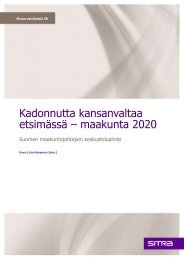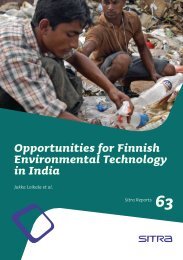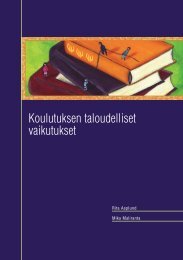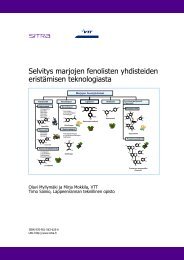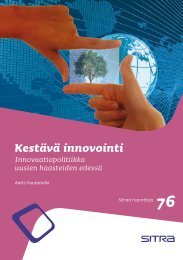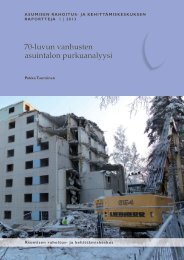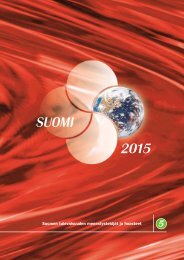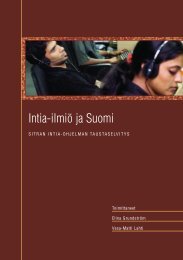NETS - Green Net Finland
NETS - Green Net Finland
NETS - Green Net Finland
- No tags were found...
You also want an ePaper? Increase the reach of your titles
YUMPU automatically turns print PDFs into web optimized ePapers that Google loves.
an increased determination of the government of the industrialized countries and developingcountries to tackle the problems together. The millennium goals, the EU countries programmes onwater and the concept Integrated Water Resources Management are the main guidelines forEuropean community.The view point and approach regarding water sector was different from that of energy sector. It wasagreed that Nordic countries traditionally have succeeded in water related business but arenowadays losing opportunities and this trend need to be changed. Past and recent experiences andstudies in the water resources sector, particularly in the water supply and sanitation sub-sector,show that a number of issues which hampered the development of the sector are still outstandingand need to be addressed immediately to avoid further widening gaps in the sector. Among themajor issues identified are the following: fragmented planning in the sector, lack of comprehensiveregulation, inadequate institutional capacity and financial constraints.The market is huge in the water sector as the demand for drinking water and sanitation is growing.In general, existing water supply systems have problems meeting the growing demand for watereven in developed countries. Some urban areas are already experiencing severe water shortages andthreatened water supply sources. Existing sanitation and sewerage services are also unsatisfactoryand inadequate to meet health and environmental standards, which eventually result in groundwaterand surface water pollution and outbreaks of epidemics of waterborne diseases.Many developing countries have problems in accessing appropriate water quality monitoringtechnologies to enable them collect the type of data which permit useful assessment, coherentenvironmental management and which can guide investment decisions. Water quality data programsare often fragmented, often collect the type of information, that does not reflect the real needs andobjectives, and are inefficient in terms of information collection, use and cost. Also conventionalwater quality monitoring methods are increasingly less suitable due to their cost and their inabilityto deliver results quickly.It has thus been identified that a key constraint on the development of the sector is the access tocapital and innovative technology. New technology solutions are very import tools for being able toreach the millennium goals. Development of cost effective small scale technologies is the righttrack. Innovative technology solutions that are easy to adapt in the developing countries and scaleconcepts are important.The challenge and also opportunities in developing the technologies are enormous and thus verypotential for the Nordic countries that could form “a silicon valley” for water technologies due tolong research experience, strong economic development and a history of entrepreneurship.The country-specific priority areas were studied in <strong>NETS</strong> resulting in:NorwayDenmark• Coastal zone water management• Measurements of water quality• Discharges of oil• Manure dispersal• Drinking water• Change in water consumption• Rain water issues23



